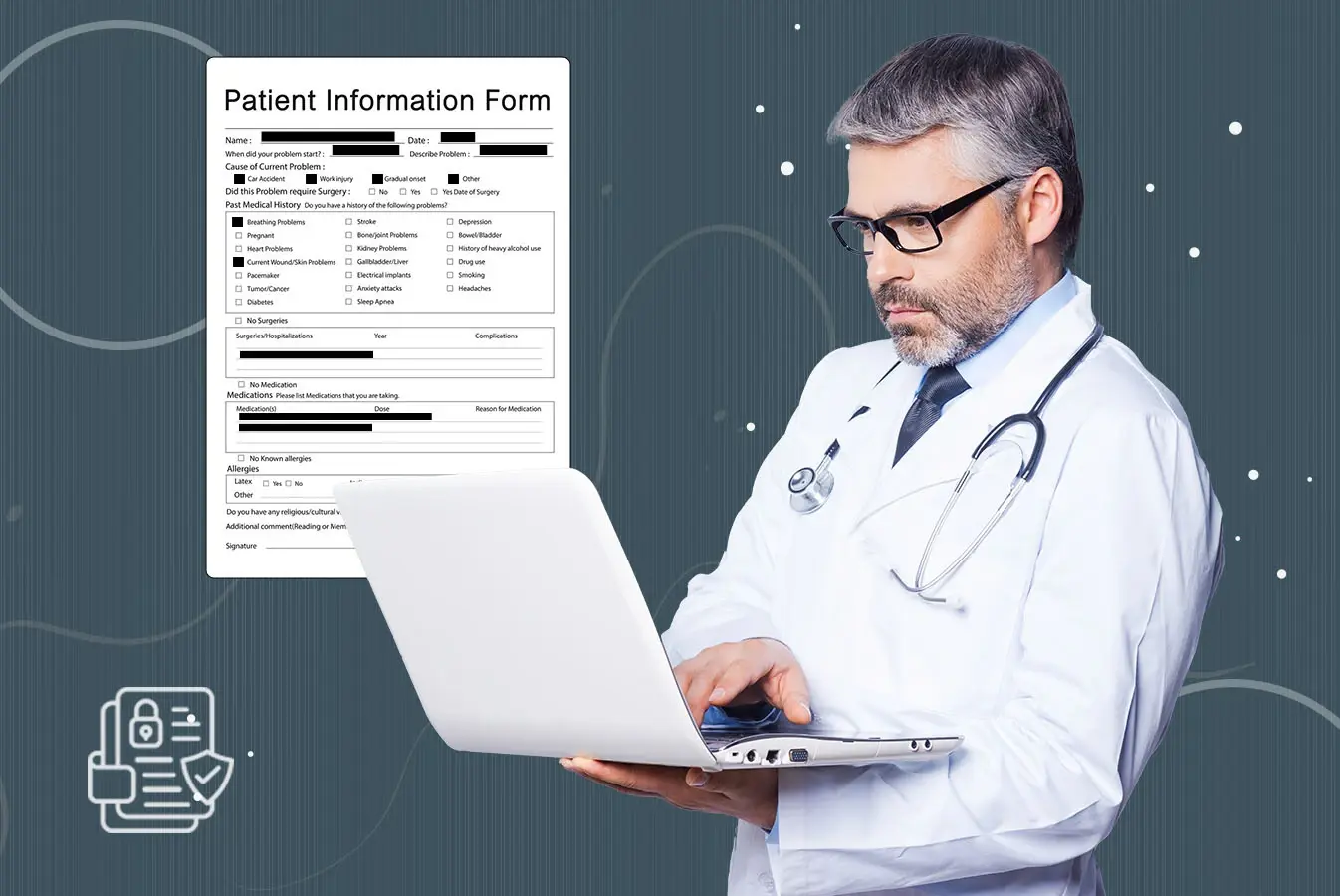In today's healthcare landscape, safeguarding patient confidentiality is not just a legal requirement but an essential pillar of trust. Even the thought of your medical history, treatments, and personal information in the wrong hands is unsettling.
The problem is that the healthcare industry collects and manages massive amounts of data. To paint a clearer picture — among many data sources, clinical data alone amounts to 19 terabytes per year, which equates to 19,000 Gigabytes.
In fact, data generated by the healthcare industry amounts to 30% of the world's data volume. And this number will keep increasing as it is expected that by 2025, the CAGR of healthcare data will reach 36%.
What's alarming is that data breaches have considerably increased, so safeguarding is turning out to be a considerable challenge.
A recent statistic reveals the gravity of the situation. In the first three months of 2023, healthcare firms reported 145 data breaches, per the U.S. government's Office for Civil Rights (OCR). These breaches underline the urgent need for robust data privacy measures.
The Health Insurance Portability and Accountability Act (HIPAA) is pivotal in safeguarding patient confidentiality. HIPAA statistics highlight its significance, with roughly 95% of the U.S. population disclosing their medical information between 2009 and 2021.
This blog highlights the complexities of data privacy in healthcare. We will explore why it's not just a legal obligation but a moral duty.
(Or skip to the end for a visual demonstration of VIDIZMO's Redactor).
What is PHI PCI and PII?
In healthcare data security and privacy, understanding the distinctions between PHI (Protected Health Information), PCI (Payment Card Industry), and PII (Personally Identifiable Information) is essential.
PHI (Protected Health Information)
PHI refers to sensitive health-related information, including medical history, treatments, and insurance data.
It is crucial in healthcare data security to maintain patient confidentiality and comply with regulations.
PCI (Payment Card Industry)
PCI pertains to information related to payment card transactions, such as credit card numbers.
While not exclusive to healthcare, its significance lies in securing financial data in healthcare payment processes.
PII (Personally Identifiable Information)
PII encompasses personal data that can identify individuals, such as names, addresses, and Social Security numbers.
In healthcare data security, safeguarding PII is essential to protect patients' identities and privacy. Learn more about PII on our dedicated blog post.
What is an Example of PHI, PII, and PCI?
Here are some common examples of PHI:
- Medical Diagnosis: Information about specific medical conditions or diseases a healthcare provider diagnoses.
- Prescription Medications: Details about the medications prescribed to a patient, including the drug name and dosage.
- Patient ID Numbers: Unique identifiers assigned by healthcare organizations to patients.
- Medical Procedures: Records of medical procedures and surgeries undergone by a patient.
- Health Insurance Information: Health Insurance policies, claims, and coverage data.
Here are some common examples of PII:
- Name: Your full name or even just your first and last name can be considered PII because it can be used to identify you.
- Social Security Number (SSN): Your SSN is a unique identifier that can be used for various purposes, including financial transactions.
- Phone Number: Your phone number, especially when combined with other information, can be used to identify you.
- Mailing Address: Your physical address is another example of PII. It reveals your location and identity.
Here are some common examples of PCI:
- Cardholder Data (CHD): This includes information on the payment card, such as the primary account number (PAN), cardholder name, and expiration date.
- Sensitive Authentication Data (SAD): SAD includes data for authentication purposes, like the card's security code (CVV, CVC, or CID) and complete magnetic stripe data.
- Cardholder Data Environment (CDE): The environment where cardholder data is stored, processed, or transmitted. It includes network devices, servers, and applications.
- Encryption Keys: Keys used to encrypt and decrypt sensitive cardholder data to protect it from unauthorized access.
Why is Preserving Patient Confidentiality Crucial in Healthcare?
Now that we've understood the three types of healthcare data, we need to know why preserving its privacy is crucial for organizations.
Here are four reasons why:
1. Patient Data Breaches May Incur Huge Financial Losses
Healthcare data breaches pose significant risks for organizations. HIPAA has been enacted to ensure the privacy and security of PHI.
HIPAA imposed an $875,000 fine on Oklahoma State University's Center for Health Services following a data breach where hackers compromised its medical data. Alarming, isn't it?
Organizations must comply with HIPAA regulations and protect sensitive patient data to prevent massive losses.
2. Compliance with Regulations
Strict regulations like HIPAA and PCI DSS bind healthcare organizations. Failing to protect PCI and PII results in fines and tarnishes the reputation of healthcare providers.
3. Protecting Patient Trust
According to the Office for Civil Rights (OCR) Breach Portal, the first four months of 2023 have seen a marked increase in data breaches affecting healthcare entities.
Patients entrust healthcare providers with sensitive so breaches like these can lead to reputational damage for healthcare organizations and potentially affect patient trust.

4. Protecting the Financial Interests of Patients (PCI)
PCI data involves financial information used for healthcare payments. Breaches can lead to financial loss for patients, causing distress and undermining confidence in healthcare institutions.
VIDIZMO Redactor: Enhancing Healthcare Privacy and Compliance
VIDIZMO Redactor plays a pivotal role in upholding privacy within the healthcare sector. This advanced tool empowers healthcare organizations to protect sensitive patient information, comply with privacy regulations, and mitigate the risk of privacy breaches.
Here are just a few of its extensive capabilities:
- Spoken PII Detection and Redaction (New Feature): Automatically detects and redacts Personally Identifiable Information (PII) like names, addresses, SSNs, and phone numbers from audio or video files to enhance data privacy.
- Bulk Upload: VIDIZMO allows bulk uploads of digital files, which the system will automatically transcribe in the case of a video or audio. The system will automatically detect PII in transcripts, helping you redact specific segments of audio containing sensitive information.
- Image and Video Redaction: In images and videos, VIDIZMO automatically detects personal information, such as faces, license plates, and persons.
- Document Redaction: VIDIZMO automatically detects ZIP codes, phone numbers, social security numbers, taxpayer identification numbers, etc.
Crucially, our Redactor adheres to essential compliance standards such as HIPAA and GDPR.
Claim Your Free Trial!
Ensuring the security of PII, PHI, and PCI in healthcare is not just a legal obligation; it's a foundation of trust between patients and healthcare providers.
This blog explored the distinctions between PHI, PII, and PCI, highlighting the importance of preserving patient confidentiality. VIDIZMO's Redactor is a robust solution that ensures compliance and safeguards patient trust.
Head over to VIDIZMO for a free seven-day trial today.
For more information, contact us today or visit our website for details.
Posted by VIDIZMO Team
We at VIDIZMO are experts in secure and compliant video streaming and digital evidence management. Our aim is to help educate such that you can better utilize your video data.





